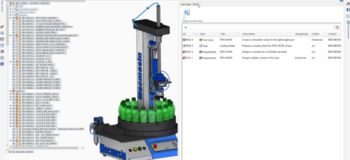Solid Edge 2019 – What’s in it for me?

Our Solid Edge customers come from a huge variety of industries and are often the leaders in their industry sector or segment. This blog looks at the Solid Edge 2019 release from the perspective of our customers in different industries.
Industrial Machinery and Equipment is our biggest industry sector for Solid Edge. For users in this industry we believe the new Solid Edge Electrical Design modules can have a big impact. Many of our customers in this area have been creating wiring schematics and wire harness designs for their machines and equipment for many years, and for others, the increasing use of sensors and the advent of IOT has meant that they are adding electrical components to their products for the first time. In the past we have worked with 3rd party software suppliers to try and integrate the design processes for wiring schematics and wire harnesses with the mechanical design processes supported by Solid Edge. Following our merger with Mentor, we can take advantage of Mentor’s best-in-class capabilities in this area to introduce 2 new solutions: Solid Edge Wiring Design and Solid Edge Harness Design. These follow the characteristics of existing Solid Edge portfolio solutions of being affordable and easy-to-use, and, of course, are closely integrated with Solid Edge. These new modules make it easier for electrical and mechanical engineers to collaborate during the design of electromechanical products, and then simulate and validate the performance of the product in the virtual world before making expensive physical prototypes or manufacturing the final product. For example, you can optimize the electromechanical performance of your product by calculating power requirements and losses, specifying the correct wire lengths and diameters, and building wire harnesses in the most efficient way.
 Design, simulation and validation of electromechanical systems is supported by new Solid Edge Electrical Design solutions in Solid Edge 2019
Design, simulation and validation of electromechanical systems is supported by new Solid Edge Electrical Design solutions in Solid Edge 2019
 For Solid Edge users in the Medical Devices & Consumer Devices industry sectors the new Solid Edge PCB Layout and Solid Edge PCB Schematic solutions will be of interest. Looking through our customer success stories in these industries we see a large number of medical and consumer devices with at least one printed circuit board being used. The ability to package a PCB efficiently within a small device is critical for the performance and aesthetics of these devices, and an excellent example of this is our Solid Edge user Sensile Technologies who manufacture devices for highly precise dosing and application of liquid medicines. These solutions support both the electronic design of the PCB itself, the validation of its operation, and the ability to create a 3D model of the PCB. In fact, the shape of the board can be specified initially within the Solid Edge Assembly and sent to Solid Edge PCB Layout to select and place the electronic components. Changes made in the PCB environment are reflected in the Solid Edge assembly and vice-versa.
For Solid Edge users in the Medical Devices & Consumer Devices industry sectors the new Solid Edge PCB Layout and Solid Edge PCB Schematic solutions will be of interest. Looking through our customer success stories in these industries we see a large number of medical and consumer devices with at least one printed circuit board being used. The ability to package a PCB efficiently within a small device is critical for the performance and aesthetics of these devices, and an excellent example of this is our Solid Edge user Sensile Technologies who manufacture devices for highly precise dosing and application of liquid medicines. These solutions support both the electronic design of the PCB itself, the validation of its operation, and the ability to create a 3D model of the PCB. In fact, the shape of the board can be specified initially within the Solid Edge Assembly and sent to Solid Edge PCB Layout to select and place the electronic components. Changes made in the PCB environment are reflected in the Solid Edge assembly and vice-versa.
We also have many Solid Edge users designing and manufacturing modular process plant and equipment in the Energy & Utilities sector. This looks like an exciting industry to be working in right now with huge investments taking place globally to improve the efficiency of existing process plants and to integrate more renewable energy sources into the power supply system. Creating piping & instrumentation diagrams (P&ID) is a key first step when designing the components required to transport and process gases and liquids, and Solid Edge P&ID Design performs this task admirably. These P&ID diagrams can be easily developed into full 3D models of the piping and components using Solid Edge Piping Design and integrated into your equipment designs that are performed in Solid Edge. An excellent example of a customer integrating piping design with equipment design in Solid Edge is Kaspar Schulz, a manufacturer of equipment and complete brewing systems based in Bavaria. Using new software modules for modular plant design, Solid Edge users can create P&ID diagrams and develop them into 3D models of process plants
Using new software modules for modular plant design, Solid Edge users can create P&ID diagrams and develop them into 3D models of process plants
And finally another new solution in Solid Edge 2019 that we believe will be useful across many different industry sectors, but possibly even more valuable for those Solid Edge users who need to prove compliance with specific industry regulations is Solid Edge Requirements Management. This web based application enables you to capture the requirements you receive from customers in many different formats; for example specifications, emails and test results, and link these to parts and assemblies in Solid Edge. These requirements are then easily visible to your designers, and the satisfaction of these requirements can also be captured. Requirements can be a simple customer request, for example the color of paint to be used, or could be a detailed requirement to prove compliance with a specific industry regulation.
 Solid Edge Requirements Management allows you to accurately link and track requirements during the product design and manufacturing process
Solid Edge Requirements Management allows you to accurately link and track requirements during the product design and manufacturing process



Comments